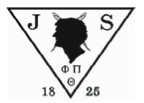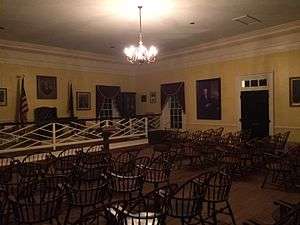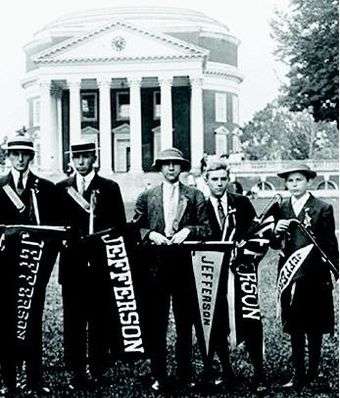Jefferson Literary and Debating Society
The Jefferson Literary and Debating Society (commonly known as the Jefferson Society or "Jeff Soc") is the oldest student organization at the University of Virginia, having been founded on July 14, 1825, in Room Seven, West Lawn.[1] As such, it is one of the oldest collegiate societies in North America.[2] It is also the second oldest Greek-lettered organization in the United States, after Phi Beta Kappa. The Society's Greek-letters are ΦΠΘ, initials for Φίλοί, Πατρίς, θεός (philoi, patris, theos, or "brotherhood, fatherland, divinity"). Its Latin motto, Haec Olim Meminisse Iuvabit, is taken from Virgil's Aeneid and roughly translated, "In the future it will be pleasing to remember these things."
| The Jefferson Society | |
|---|---|
| ΦΠΘ | |
 | |
| Founded | July 14, 1825 University of Virginia |
| Motto | Haec Olim Meminisse Iuvabit |
| Colors | Pink, Gray, and Blue |
| Website | jeffersonsociety.org |
The Society regularly meets on Friday evenings at Hotel C in the Academical Village, referred to as "Jefferson Hall", "Jeff Hall", or simply "The Hall". Room Seven, West Lawn, is also maintained by the Jefferson Society, selecting a Fourth Year student to live there. The Society hosts several events throughout the year including its Distinguished Speaker Series,[3] for which it invites prominent scholars and speakers across disciplines to address students. The Society also hosts formal social events including Wilson's Day, the Restoration Ball, and Founder's Day, first held in 1832.

History
Membership in the Society grew rapidly in the early years after its founding. By 1855, the University of Virginia was the second largest University in the nation after Harvard University, enrolling 645 students. That school year, the Society admitted 155 new members: nearly a quarter of the student body of the University.
In the hotheaded antebellum years, the Society could become raucous. Its elections were condemned by the Faculty for "such turbulence as to degrade the reputation of the University."[4] An especially coveted honor was to be selected as "final orator," a post apparently comparable to that of a valedictorian today.
The Society played a key role in establishing student journalism at the University, founding the University Magazine as early as 1856.[5] Later known as the Virginia Spectator, the paper played a major part in University life for a century, with its profile ranging from high seriousness to satire, until being shut down by the president of the University in the late 1950s for obscenity.[6] The Jefferson Society sponsored the magazine for many decades.[7]

Also in 1856, the Society expressed its approval of the caning of Charles Sumner by sending Preston Brooks a new gold-headed cane to replace his broken one.[8]
Possessions
- The Sully Portrait is one of the only portraits of Thomas Jefferson painted from life. It was painted by Thomas Sully and is loaned to the University of Virginia to be displayed in the Rotunda.
- Edgar Allan Poe signed a minutes book one evening during which he served as secretary pro tem. His signature was later clipped out by Lancelot Blackford in the 1850s, stealing it, yet also saving it from the Great Rotunda Fire in 1895. Society alumni raised money to buy the signature from a collector in the early 1980s, in honor of their friend and fellow alumnus, James F. Perz. The signature is kept in secure storage as part of the University library's special collections.
- Thomas Woodrow Wilson signed one of the roll books during his tenure as the Society's President. Furthermore, the Society's minute books also contain many sets of handwritten minutes signed by Wilson when he was the Society's Secretary.
Notable Members
- Edgar Allan Poe, author of The Raven[9]
- Woodrow Wilson, 28th President of the United States[10]
- Colgate W. Darden, Governor of Virginia[11]
- John T. Casteen III, University of Virginia President[12]
- James Gilmore III, Governor of Virginia[13]
- Deidre Downs, Miss America 2005[14]
Honorary Members
- James Madison, 4th President of the United States[15]
- James Monroe, 5th President of the United States[15]
- Gilbert du Motier, Marquis de Lafayette[15]
- Edith Bolling Galt Wilson, former First Lady of the United States[11]
- William Faulkner, Nobel Prize for Literature recipient[11]
- Margaret Thatcher, former Prime Minister of the United Kingdom[11]
Thomas Jefferson turned down an invitation for honorary membership in an August 12, 1825 letter, citing his need to avoid altering his relationship with the University and its students.[15]
Related
- The Dialectic and Philanthropic Societies at University of North Carolina at Chapel Hill
- The Philodemic Society at Georgetown University
- The Philolexian Society at Columbia University
- The Philomathean Society at the University of Pennsylvania
- The Union-Philanthropic Society at Hampden–Sydney College
- The Eumenean Society and Philanthropic Society at Davidson College
- The Euphradian Society and Clariosophic Society at the University of South Carolina
- The Washington Literary Society and Debating Union at the University of Virginia
- The Stubbs Society at the University of Oxford
- The Demosthenian Literary Society at the University of Georgia
Notes and references
- https://jeffersonsociety.org
- University of Virginia - Learn Our Traditions and Lingo Archived 2009-05-10 at the Wayback Machine
- https://jeffersonsociety.org/speaker-series/
- Dabney, p. 12
- More, John, History of the Jefferson Society, 1825–1957, noting that the magazine was first mentioned in the Society's minutes in 1865
- Dabney, pp. 552, 606
- Dabney, p. 181
- Puleo, Stephen (2012). The Caning: The Assault That Drove America to Civil War. Yardley, PA: Westholme Publishing LLC. pp. 102, 114–115. ISBN 978-1-59416-516-0.
- Harrison, James Albert (1903). The life of Edgar Allan Poe. T.Y. Crowell & Company. pp. 60–61.
edgar allan poe jefferson society.
- Kraig, Robert Alexander (2004). Woodrow Wilson and the Lost World of the Oratorical Statesman. p. 42.
- "Jefferson Society Famous Members (Revised)" (PDF). University of Virginia Board of Visitors. 2013-11-14.
- "UVa President John Casteen Discusses School History with Students". Newsplex.com. 2010-02-01. Retrieved 2014-10-06.
- "Virginia is for Lovers: Romance at the University". UVA Magazine. Retrieved 2014-10-06.
- Gunay, Dafne (2004-10-20). "Cavalier Royalty". The Cavalier Daily. Archived from the original on 2011-06-17. Retrieved 2006-11-09.
I played varsity volleyball, I was in the Jefferson Society, A Chi O sorority, U.Dems and I was also an honor advisor.
- "HNAI Long Beach Hard Times Tokens Auction Catalog". 2007. p. 95.
- Carrier, Jerry and Michael Stewart. Hotel C, West Range, University of Virginia. University of Virginia Press.
- Dabney, Virginius (1981). Mr. Jefferson's University: A History. Charlottesville: University of Virginia Press. ISBN 0-8139-0904-X.
- Patton, John S. (1906). Jefferson, Cabell, and the University of Virginia. New York: Neale Publishing Company. p. 235.
jefferson society cabell patton.